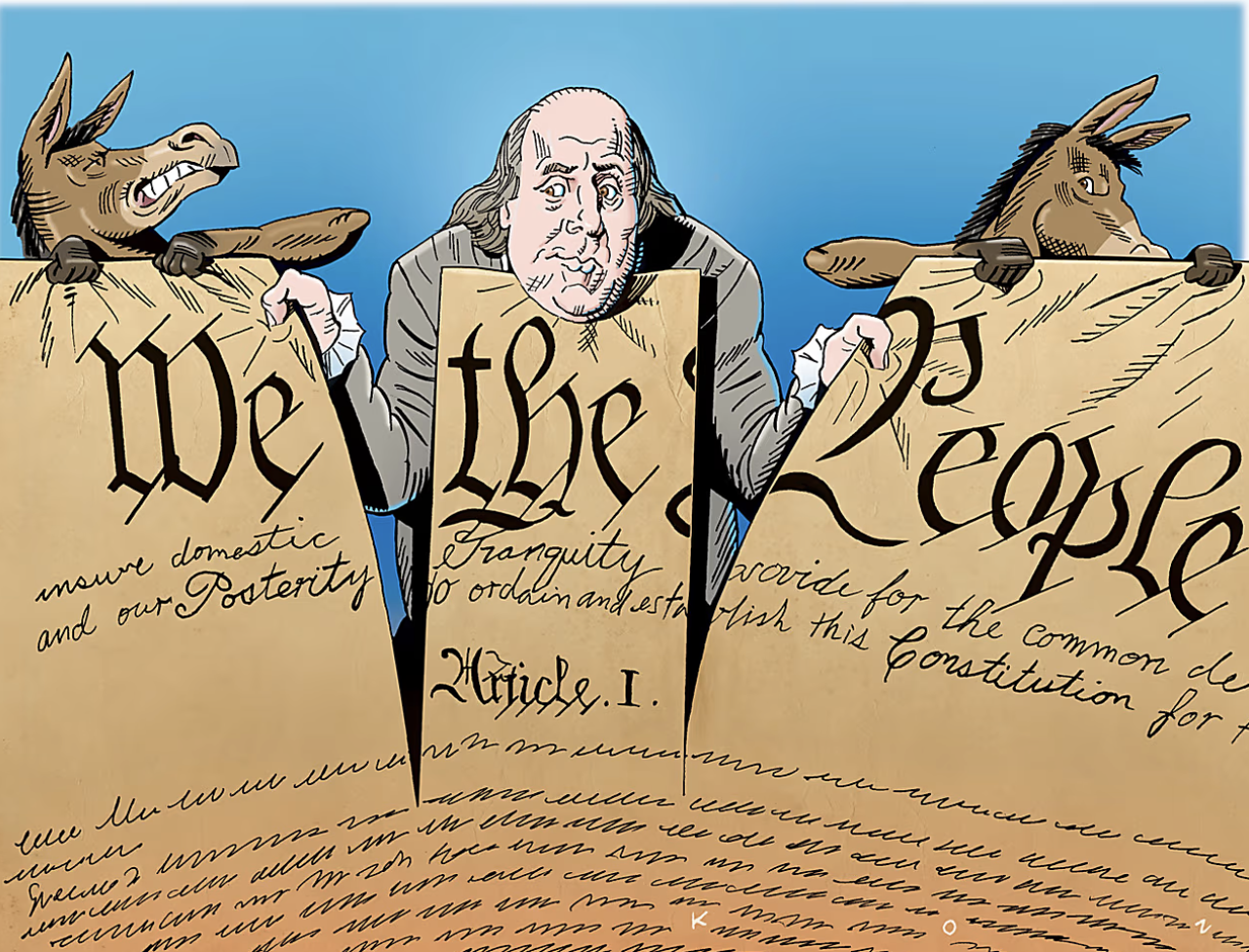By: Jonathan Turley – wsj.com – September 12, 2024
It goes beyond proposals to pack the Supreme Court and even targets the freedom of speech.
Kamala Harris declared in Tuesday’s debate that a vote for her is a vote “to end the approach that is about attacking the foundations of our democracy ’cause you don’t like the outcome.” She was alluding to the 2021 Capitol riot, but she and her party are also attacking the foundations of our democracy: the Supreme Court and the freedom of speech.
Ms. Harris quickly endorsed the proposal in a statement, citing a “clear crisis of confidence” in the court owing to “decision after decision overturning long-standing precedent.” She might as well have added “because you don’t like the outcome.” Sen. Sheldon Whitehouse (D., R.I.) has already introduced ethics and term-limits legislation and said Ms. Harris’s campaign has told him “that your bills are precisely aligned with what we are talking about.”
The attacks on the court are part of a growing counterconstitutional movement that began in higher education and seems recently to have reached a critical mass in the media and politics. The past few months have seen an explosion of books and articles laying out a new vision of “democracy” unconstrained by constitutional limits on majority power.
Erwin Chemerinsky, dean of the UC Berkeley law school, is author of “No Democracy Lasts Forever: How the Constitution Threatens the United States,” published last month. In a 2021 Los Angeles Times op-ed, he described conservative justices as “partisan hacks.”
In the New York Times, book critic Jennifer Szalai scoffs at what she calls “Constitution worship.” She writes: “Americans have long assumed that the Constitution could save us; a growing chorus now wonders whether we need to be saved from it.” She frets that by limiting the power of the majority, the Constitution “can end up fostering the widespread cynicism that helps authoritarianism grow.”
In a 2022 New York Times op-ed, “The Constitution Is Broken and Should Not Be Reclaimed,” law professors Ryan D. Doerfler of Harvard and Samuel Moyn of Yale called for liberals to “reclaim America from constitutionalism.”
Others have railed against individual rights. In my new book on free speech, I discuss this movement against what many professors deride as “rights talk.” Barbara McQuade of the University of Michigan Law School has called free speech America’s “Achilles’ heel.” In another Times op-ed, “The First Amendment Is Out of Control,” Columbia law professor Tim Wu, a former Biden White House aide, asserts that free speech “now mostly protects corporate interests” and threatens “essential jobs of the state, such as protecting national security and the safety and privacy of its citizens.” George Washington University Law’s Mary Ann Franks complains that the First Amendment (and also the Second) is too “aggressively individualistic” and endangers “domestic tranquility” and “general welfare.”
Mainstream Democrats are listening to radical voices. “How much does the current structure benefit us?” Rep. Alexandria Ocasio-Cortez (D., N.Y.) said in 2021, explaining her support for a court-packing bill. “I don’t think it does.” Kelley Robinson, president of the Human Rights Campaign, said at the Democratic National Committee’s “LGBTQ+ Kickoff” that “we’ve got to reimagine” democracy “in a way that is more revolutionary than . . . that little piece of paper.” Both AOC and Ms. Robinson later spoke to the convention itself.
The Nation’s Elie Mystal calls the Constitution “trash” and urges the abolition of the U.S. Senate. Rosa Brooks of Georgetown Law School complains that Americans are “slaves” to the Constitution.
Without countermajoritarian protections and institutions, politics would be reduced to raw power. That’s what some have in mind. In an October 2020 interview, Harvard law professor Michael Klarman laid out a plan for Democrats should they win the White House and both congressional chambers. They would enact “democracy-entrenching legislation,” which would ensure that “the Republican Party will never win another election” unless it moved to the left. The problem: “The Supreme Court could strike down everything I just described, and that’s something the Democrats need to fix.”
Trashing the Constitution gives professors and pundits a license to violate norms. The Washington Monthly reports that at a Georgetown conference, Prof. Josh Chafetz suggested that Congress retaliate against conservative justices by refusing to fund law clerks or “cutting off the Supreme Court’s air conditioning budget.” When the audience laughed, Harvard’s Mr. Doerfler snapped back: “It should not be a laugh line. This is a political contest, these are the tools of retaliation available, and they should be completely normalized.”
The cry for radical constitutional change is shortsighted. The constitutional system was designed for bad times, not only good times. It seeks to protect individual rights, minority factions and smaller states from the tyranny of the majority. The result is a system that forces compromise. It doesn’t protect us from political divisions any more than good medical care protects us from cancer. Rather it allows the body politic to survive political afflictions by pushing factions toward negotiation and moderation.
When Benjamin Franklin said the framers had created “a republic, if you can keep it,” he meant that we needed to keep faith in the Constitution. Law professors mistook their own crisis of faith for a constitutional crisis. They have become a sort of priesthood of atheists, keeping their frocks while doffing their faith. The true danger to the American democratic system lies with politicians who would follow their lead and destroy our institutions in pursuit of political advantage.
To see this article in its entirety and to subscribe to others like it, please choose to read more.
 Listen Online
Listen Online Watch Online
Watch Online Find a Station in Your Area
Find a Station in Your Area








 Listen Now
Listen Now Watch Online
Watch Online
